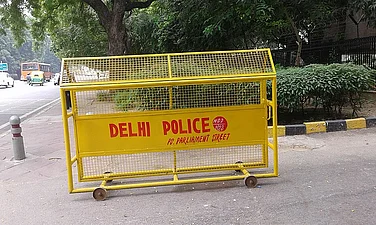The Supreme Court on Friday sought response from the Centre and others on a plea seeking direction to take stringent steps to control fraudulent religious conversion by "intimidation" and through "gifts and monetary benefits".
A bench of Justices M R Shah and Krishna Murari issued notices to the Union of India, Ministry of Home Affairs and Ministry of Law and Justice. The top court asked the parties to file a reply by November 14.
The apex court was hearing a plea filed by advocate Ashwini Kumar Upadhyay seeking direction to the Centre and states to take stringent steps to control fraudulent religious conversion by "intimidation, threatening, deceivingly luring through gifts and monetary benefits".
In his plea Upadhyay submitted, "The injury caused to the citizens is extremely large because there is not even one district which is free of religious conversion by 'hook and crook'.”
"Incidents are reported every week throughout the country where conversion is done by intimidating, threatening, deceivingly luring through gifts and monetary benefits and also by using black magic, superstition, miracles but Centre and States have not taken stringent steps to stop this menace,” the plea added.
However, the decision came in contrast to the earlier positions taken by the same court and the High Courts in recent times. Ashwin Upadhyay has been the most consistent pleader on this issue. Here, we will find out three significant instances that speak to the current shift in the stance of the Judiciary.
‘More of a Publicity Interest than Public Interest’: SC, March, 2022
While hearing a petition that challenged an earlier order of Madras High Court pertaining to the forceful conversion, the SC bench of Justices Indira Banerjee and A S Bopanna noted that such petitions were more about publicity interest than the public interest. Scolding the counsel for disturbing the harmony, the bench said, “You are actually disturbing the harmony with these kinds of petitions.”
The top court was hearing a plea challenging the Madras High Court’s decision of not directing the Centre and the Tamil Nadu state government to constitute a board of surveillance to monitor the actions of Christian Missionaries.
In reference to the proper implementation of the Tamil Nadu Prohibition of Forcible Conversion of Religion Act, 2002, the Madras HC said, “We can only hope and trust that the official respondents would give effect to the provision of the Act in letter and spirit.”
However, the Special Leave Petition filed in SC against the HC order noted that there has been huge rise in the cases of forceful conversion from Hinduism to other religions, especially Christianity with allurement of money and other means in the last few years. As the SC denied entertaining the SLP, the petitioner immediately took it back.
‘Harmful Kind of Public Interest’: SC, April, 2021
Lashing out at the petitioner seeking court directives on the religious conversions done through ‘carrot and stick’ method, the SC bench led by Justice Rohinton F. Nariman said, “Why should a person above 18 years not choose his religion? What kind of a writ petition is this? We will impose heavy costs on you... Withdraw it or argue and risk the consequences.”
Upholding the Article 25 that allows people to profess, practice and propagate religion, Justice Nariman asked, “Why do you think there is the word ‘propagate’?” Emphasizing that the choice of religion and marriage are made by individuals the bench upheld the inviolability of right to privacy that is directly related to the life, dignity and liberty of the person.
Interestingly this petition was also filed by Ashwin Kumar Upadhyay, the petitioner in the current SC case, who sought the directions from the Court on the ground that “there is not even one district which is free of black magic, superstition and religious conversion... Incidents are reported every week throughout the country where conversion is done by intimidating, threatening, luring through gifts and monetary benefits.”
‘Every Person has Right to Choose Religion’: Delhi HC, June, 2022
Interestingly, Upadhyay’s another petition in Delhi High Court this year received the same fate as the earlier one. Marking an observation on the fundamentality of Article 25 of the constitution, Justice Sanjeev Sachdeva said, "(Religious) conversion is not prohibited in law. Every person has a right to choose and profess any religion of his/her choice. It is a Constitutional right. If someone is forced to convert, then it's different issue but to convert is a person's prerogative.”
The Delhi HC bench asked Upadhyay, “What is the basis for this prayer? There is no material basis on record. No document, no instance. You have given three Supreme Court judgments and rest is your averment”.
Bashing at the comments of the petitioner that there have been several cases of mass conversions, the bench asked, “You have said mass conversion. Where are statistics? Has any aggrieved come forward?"
These previous cases give us a picture about the stance of higher judiciaries in the pleases related to forced conversions. The SC’s entertainment of the recent plea is in dire contrast to its vowed position of upholding Article 25.
(With PTI Inputs)




















.png?w=200&auto=format%2Ccompress&fit=max)





